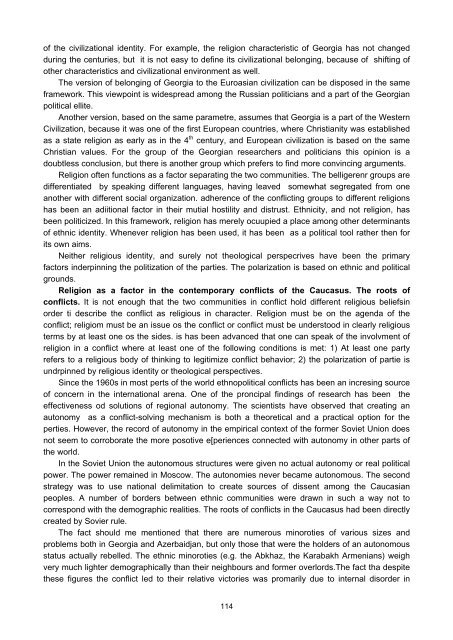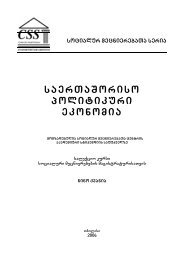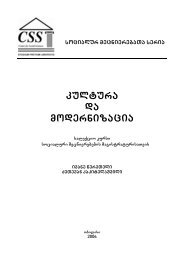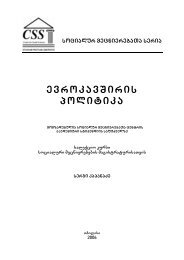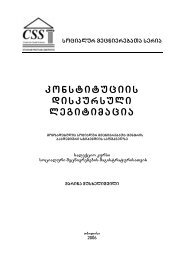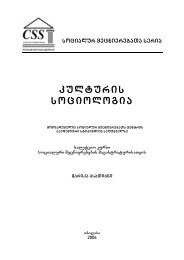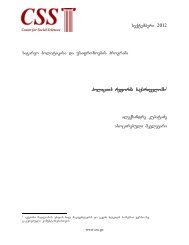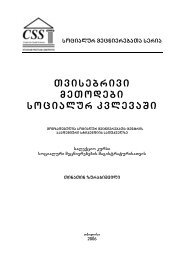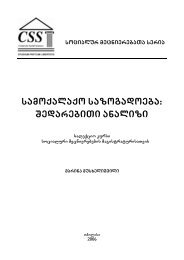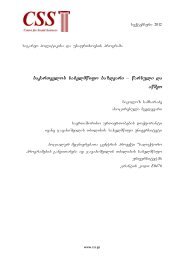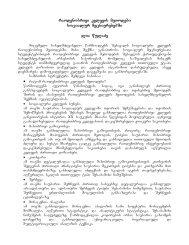kavkasiis geografiuli garemo da mosaxleoba - Center for Social ...
kavkasiis geografiuli garemo da mosaxleoba - Center for Social ...
kavkasiis geografiuli garemo da mosaxleoba - Center for Social ...
Create successful ePaper yourself
Turn your PDF publications into a flip-book with our unique Google optimized e-Paper software.
of the civilizational identity. For example, the religion characteristic of Georgia has not changed<br />
during the centuries, but it is not easy to define its civilizational belonging, because of shifting of<br />
other characteristics and civilizational environment as well.<br />
The version of belonging of Georgia to the Euroasian civilization can be disposed in the same<br />
framework. This viewpoint is widespread among the Russian politicians and a part of the Georgian<br />
political ellite.<br />
Another version, based on the same parametre, assumes that Georgia is a part of the Western<br />
Civilization, because it was one of the first European countries, where Christianity was established<br />
as a state religion as early as in the 4 th century, and European civilization is based on the same<br />
Christian values. For the group of the Georgian researchers and politicians this opinion is a<br />
doubtless conclusion, but there is another group which prefers to find more convincing arguments.<br />
Religion often functions as a factor separating the two communities. The belligerenr groups are<br />
differentiated by speaking different languages, having leaved somewhat segregated from one<br />
another with different social organization. adherence of the conflicting groups to different religions<br />
has been an adiitional factor in their mutial hostility and distrust. Ethnicity, and not religion, has<br />
been politicized. In this framework, religion has merely ocuupied a place among other determinants<br />
of ethnic identity. Whenever religion has been used, it has been as a political tool rather then <strong>for</strong><br />
its own aims.<br />
Neither religious identity, and surely not theological perspecrives have been the primary<br />
factors inderpinning the politization of the parties. The polarization is based on ethnic and political<br />
grounds.<br />
Religion as a factor in the contemporary conflicts of the Caucasus. The roots of<br />
conflicts. It is not enough that the two communities in conflict hold different religious beliefsin<br />
order ti describe the conflict as religious in character. Religion must be on the agen<strong>da</strong> of the<br />
conflict; religiom must be an issue os the conflict or conflict must be understood in clearly religious<br />
terms by at least one os the sides. is has been advanced that one can speak of the involvment of<br />
religion in a conflict where at least one of the following conditions is met: 1) At least one party<br />
refers to a religious body of thinking to legitimize conflict behavior; 2) the polarization of partie is<br />
undrpinned by religious identity or theological perspectives.<br />
Since the 1960s in most perts of the world ethnopolitical conflicts has been an incresing source<br />
of concern in the international arena. One of the proncipal findings of research has been the<br />
effectiveness od solutions of regional autonomy. The scientists have observed that creating an<br />
autonomy as a conflict-solving mechanism is both a theoretical and a practical option <strong>for</strong> the<br />
perties. However, the record of autonomy in the empirical context of the <strong>for</strong>mer Soviet Union does<br />
not seem to corroborate the more posotive e[periences connected with autonomy in other parts of<br />
the world.<br />
In the Soviet Union the autonomous structures were given no actual autonomy or real political<br />
power. The power remained in Moscow. The autonomies never became autonomous. The second<br />
strategy was to use national delimitation to create sources of dissent among the Caucasian<br />
peoples. A number of borders between ethnic communities were drawn in such a way not to<br />
correspond with the demographic realities. The roots of conflicts in the Caucasus had been directly<br />
created by Sovier rule.<br />
The fact should me mentioned that there are numerous minoroties of various sizes and<br />
problems both in Georgia and Azerbaidjan, but only those that were the holders of an autonomous<br />
status actually rebelled. The ethnic minoroties (e.g. the Abkhaz, the Karabakh Armenians) weigh<br />
very much lighter demographically than their neighbours and <strong>for</strong>mer overlords.The fact tha despite<br />
these figures the conflict led to their relative victories was promarily due to internal disorder in<br />
114


